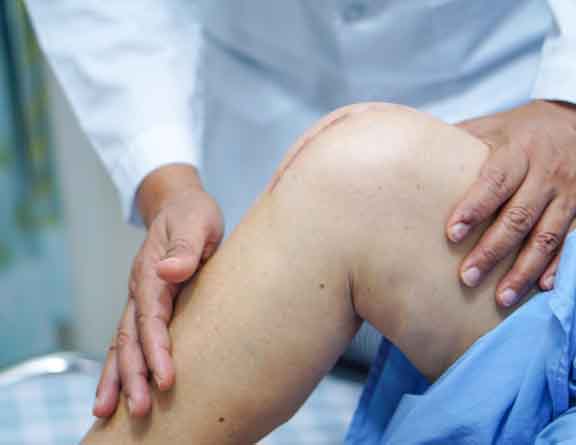What are the different kinds of knee implants?
Generally, a knee implant is made of four components, i.e., a tibial component, a femoral component, a patellar component, and a plastic spacer. Based on their components, knee implants can be categorized as:
- Metal on plastic: In this type of implant, a metal femoral component is attached to a plastic tibial component. It is the most common, least expensive kind of implant. However, these implants are not preferred as much now because the particles released due to wearing away of the plastic component can trigger an immune response in the future.;
- Ceramic on plastic: These implants feature a ceramic femoral component on a plastic tibial component. It is used in people who might have an allergy to metal implants. However, they are not preferred for the same reason as the metal on plastic implants.
- Ceramic on ceramic: In these implants, both components are made of ceramic. They are least likely to trigger an immune response. However, they are not preferred as much because they make a squeaking noise when the patient is walking. Also, they can easily shatter when subjected to very heavy loads.
- Metal on metal: In these implants, both components are made of metal. These are not widely in use as they release small amounts of metal in the bloodstream as they erode, which can cause inflammation, pain, and even permanent organ damage in the long term.
Why undergo knee replacement at Pristyn Care?
Pristyn Care is a center of excellence for knee replacement treatment. We consider our patients to be our biggest priority, and in order to ensure their care and comfort, we provide many facilities such as:
- Expert and experienced knee specialists: Pristyn Care is associated with the best knee replacement doctors with 10+ years of experience in providing safe and seamless treatment to over 2 lakh patients in over 400 cities.
- Easy consultation: It is very easy to book free appointments with the best knee surgeons through Pristyn Care at your convenience. As soon as you connect with our care coordinators, they will book an appointment for you based on your location, symptoms, and convenience.
- Affordable treatment with insurance support: We provide affordable knee arthroplasty to encourage our patients to receive treatment. We also help all patients with their insurance documentation and claim process.
- Cab and meal facility: To ensure your comfort on the day of the procedure, we will also provide you complimentary cab and meal services on the day of the surgery.
- Free follow-up: To ensure that our patients recover without any significant problems, we provide free follow-up to all our patients in the week following the surgery, along with diet consultation for the future.
How to book an appointment with the best orthopedic doctors through Pristyn Care?
You can schedule your consultation with the best knee doctors through any of the three simple ways:
- Give us a call on our helpline number. Our care coordinators will pick up the call and gather the required information to connect you with the right doctor for consultation.;
- Fill out the “Book An Appointment” form and submit your details. Our medical coordinators will get back to you shortly, and based on your symptoms, schedule the appointment with the doctors at your convenience.
- Download the dedicated patient app from Google Play Store or App Store and get in touch with our orthopedic doctors near you. Book your appointment and consult with the doctor at your preferred date and time.
Pristyn Care also offers an additional service with an online consultation mode to discuss their problems with the doctors through a virtual call without leaving their homes.










.svg)









